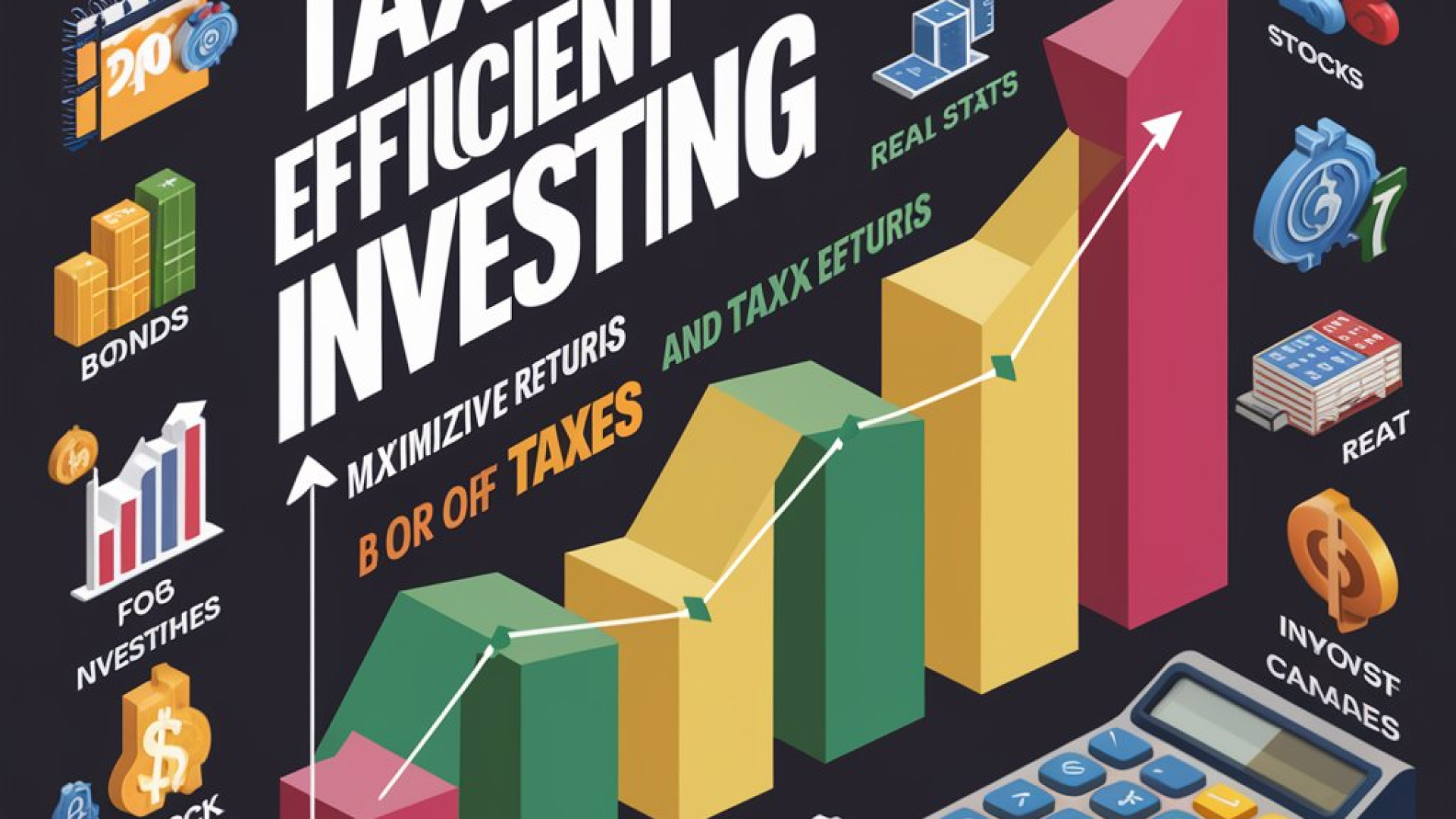Tax-Efficient Investing aims to maximize returns while minimizing taxes by strategically choosing investments with built-in tax efficiencies, like index funds or ETFs, which can help reduce the tax drag on returns. By placing investments in the right account type, such as taxable or tax-advantaged accounts, investors can further optimize tax efficiency.
Tax-efficient investing involves optimizing investment strategies to minimize tax liabilities without sacrificing returns, emphasizing the importance of selecting the right investment vehicles and accounts to enhance overall financial outcomes. With tax-efficient investing, individuals can effectively manage their investment portfolios to achieve favorable returns while keeping tax obligations in check.
Understanding Tax-efficient Investing
Tax-Efficient Investing aims to maximize returns while minimizing taxes. By strategically managing your investments, you can reduce the tax impact on your overall wealth.
Maximizing Returns
Choosing investments with built-in tax efficiencies, like index funds and ETFs, can help minimize tax drag on your returns. ETFs, in particular, offer additional tax advantages by avoiding some capital gains triggers.
Minimizing Taxes
Putting investments in the right account is key for tax efficiency. Investments that are tax-efficient should be held in taxable accounts, while those with higher tax impacts are better suited for tax-advantaged accounts.
- Preserve Wealth: By reducing tax liabilities, you can keep more of your investment earnings.
- Enhance Long-Term Growth: Minimizing taxes allows your investments to compound more effectively over time.
- Improve After-Tax Returns: Tax-efficient strategies can lead to higher after-tax returns, boosting your overall portfolio performance.
Strategies For Tax-efficient Investing
Tax-efficient investing involves maximizing returns while minimizing taxes. Strategies include choosing investments with built-in tax efficiencies, such as index funds and ETFs, and placing investments in the right accounts – taxable accounts for investments losing less to taxes and tax-advantaged accounts for those losing more.
This helps optimize investment strategies to minimize tax liabilities without sacrificing returns.
Investing In Tax-advantaged Accounts
Investing in tax-advantaged accounts is a crucial strategy for tax-efficient investing. These accounts, such as individual retirement accounts (IRAs) and 401(k)s, offer opportunities for tax savings that can significantly impact your returns. By contributing to these accounts, you can reduce your taxable income and let your investments grow tax-free until withdrawal.Utilizing Tax-loss Harvesting
Tax-loss harvesting is another effective strategy for maximizing tax efficiency. This strategy involves selling investments that have experienced a loss to offset capital gains and reduce your overall tax liability. By strategically harvesting losses, you can minimize the taxes you owe and potentially generate tax deductions.Asset Location For Tax Efficiency
Proper asset location is an often overlooked but essential aspect of tax-efficient investing. By strategically placing your investments in the right accounts, you can optimize your tax savings. Generally, investments that generate more taxable income, such as bonds and actively managed funds, are better suited for tax-advantaged accounts. On the other hand, investments that are more tax-efficient, such as index funds and tax-efficient ETFs, can be held in taxable accounts. To summarize, implementing these strategies for tax-efficient investing can have a significant impact on your overall returns. By investing in tax-advantaged accounts, utilizing tax-loss harvesting, and carefully considering the asset location of your investments, you can maximize your after-tax returns and keep more of your hard-earned money working for you. Start implementing these strategies today to take full advantage of tax-efficiency and optimize your investment portfolio’s performance.Maximizing Returns Through Tax-efficient Investing
Maximizing Returns through Tax-Efficient Investing involves strategic planning to minimize tax liabilities and boost investment gains. By utilizing various tax-efficient investment strategies, investors can optimize their returns while reducing the impact of taxes.
Choosing Investments With Built-in Tax Efficiencies
Investing in index funds, certain mutual funds, and ETFs can provide built-in tax efficiencies that help minimize the tax drag on returns. ETFs, in particular, offer an additional tax advantage by avoiding triggers for capital gains.
Utilizing Long-term Capital Gains
Opting for long-term capital gains can be a tax-efficient strategy as these gains are typically taxed at a lower rate compared to short-term capital gains. By holding investments for longer periods, investors can benefit from reduced tax liabilities.
Investing In Tax-exempt Vehicles
Including tax-exempt vehicles in your investment portfolio, such as municipal bonds, can help minimize taxes on investment returns. These vehicles often offer tax benefits that allow investors to keep more of their investment gains.

Credit: fastercapital.com
Challenges And Considerations
In tax-efficient investing, maximizing returns and minimizing taxes pose significant challenges and considerations. Choosing investments with built-in tax efficiencies, such as index funds and ETFs, helps minimize the tax drag on returns. Additionally, allocating investments in the right account, whether taxable or tax-advantaged, is crucial for optimizing tax efficiency.
Balancing Risk And Tax Efficiency
When it comes to tax-efficient investing, one of the key challenges is finding the right balance between risk and tax efficiency. While tax-efficient strategies can help investors minimize their tax liabilities, they may involve taking on additional investment risk. It is important to carefully consider the risk-return tradeoff and ensure that the tax advantages of a particular investment are worth the potential risks involved.
Impact Of Tax Laws And Regulations
Tax laws and regulations can have a significant impact on the tax efficiency of an investment. Understanding the current tax environment is crucial for maximizing tax efficiency. Each country and region may have different tax policies and regulations that affect the tax treatment of different types of investments. It is essential to stay updated with the latest tax laws and regulations to ensure you are taking full advantage of any available tax benefits.
Here are some key considerations related to tax laws and regulations:
- Tax rates: Different types of investment income may be subject to varying tax rates. It is important to consider the tax implications of different investment income, such as dividends, interest, and capital gains.
- Tax-efficient accounts: Certain types of accounts, such as Individual Retirement Accounts (IRAs) or 401(k)s, offer tax advantages. Understanding the benefits and limitations of these accounts can help you make informed investment decisions.
- Capital gains taxes: Capital gains are typically taxed differently depending on whether they are short-term or long-term. Knowing the tax rates for different holding periods can help you strategically manage your investments.
- Tax-loss harvesting: Tax-loss harvesting is a strategy that involves selling investments that have declined in value to offset capital gains and reduce taxable income. Being aware of the rules and limitations around tax-loss harvesting can be beneficial in managing your tax liability.
By considering these factors and staying informed about the impact of tax laws and regulations, investors can make more tax-efficient investment decisions and maximize their after-tax returns.
Professional Guidance And Tools
Welcome to the world of tax-efficient investing, where maximizing returns while minimizing taxes is key. In this post, we’ll explore the power of professional guidance and tools in achieving tax-efficient investment strategies. Consulting with Tax and Investment Advisors and Utilizing Tax-Efficient Investing Tools and Resources are vital steps in optimizing your investment portfolio for tax efficiency.
Consulting With Tax And Investment Advisors
When it comes to tax-efficient investing, consulting with knowledgeable tax and investment advisors is crucial. These professionals can provide personalized guidance and help you navigate the complexities of tax laws and investment strategies.
Utilizing Tax-efficient Investing Tools And Resources
Utilizing advanced tools and resources specifically designed for tax-efficient investing can significantly enhance your investment outcomes. These tools can aid in portfolio analysis, tax-loss harvesting, and assessing the tax implications of different investment options, empowering you to make well-informed decisions that minimize tax burdens.

Credit: www.bizepic.com
Real-life Examples And Case Studies
Learn how to maximize your investment returns while minimizing taxes through real-life examples and case studies. Discover strategies for choosing tax-efficient investments and explore the benefits of index funds and ETFs in reducing the tax drag on your returns. Take control of your investments and make them work smarter for you.
Real-Life Examples and Case Studies Understanding the practical application of tax-efficient investing techniques is key to maximizing returns while minimizing taxes. Real-life examples and case studies shed light on the successful implementation of tax-efficient strategies and their impact on overall investment portfolios. Successful Application of Tax-Efficient Strategies Implementing tax-efficient strategies can significantly impact your investment returns. Let’s take a look at a real-life example to illustrate this concept. In a case study, an investor diversified their portfolio by strategically allocating assets across tax-deferred accounts and taxable accounts. This approach helped reduce the overall tax burden and maximize after-tax returns. By utilizing tax-efficient investments, such as index funds and ETFs, the investor minimized the tax drag on their returns, resulting in a more tax-efficient portfolio. Impact on Overall Investment Portfolio The impact of tax-efficient strategies on the overall investment portfolio cannot be overstated. In another case study, a diversified portfolio was structured to leverage tax-efficient investments in taxable accounts and tax-advantaged accounts, such as retirement and health savings accounts. This approach optimized tax savings and allowed the investor to reinvest profits efficiently while avoiding excessive tax liabilities. By strategically placing investments in the appropriate accounts, the portfolio was able to maximize after-tax returns, highlighting the importance of tax-efficient investing in building wealth. Overall, real-life examples and case studies demonstrate the tangible benefits of tax-efficient investing, showcasing how these strategies can enhance portfolio performance while minimizing tax implications. “`Understanding Tax-efficient Investment Vehicles
In the realm of tax-efficient investing, understanding the different vehicles available can significantly impact your financial strategy. By leveraging tax-efficient investment vehicles, you can maximize your returns while minimizing tax liabilities. Let’s delve into some key options:
Municipal Bonds
Municipal bonds are debt securities issued by state and local governments to fund public projects. By investing in municipal bonds, you can generate tax-free income on the interest earned, making them a popular choice for tax-efficient investing.
Retirement Accounts
Retirement accounts, such as 401(k) plans and IRAs, offer tax advantages that can help grow your savings over time. Contributions to these accounts are typically tax-deductible, and earnings within the account are tax-deferred until withdrawal, allowing your investments to grow without immediate tax consequences.
Health Savings Accounts
Health Savings Accounts (HSAs) are designed to help individuals save for medical expenses tax-free. Contributions to HSAs are tax-deductible, and withdrawals for qualified medical expenses are exempt from taxes, making them a valuable tool for tax-efficient investing while preparing for healthcare costs.
The Future Of Tax-efficient Investing
Maximize your returns with tax-efficient investing strategies that reduce tax burdens for higher gains. Choose tax-advantaged accounts and investments wisely for optimal tax savings and financial growth.
Innovations And Trends In Tax-efficient Strategies
As the financial landscape evolves, so does the world of tax-efficient investing. Innovations and trends in tax-efficient strategies are shaping the future of this field, making it more accessible and lucrative for investors. Let’s take a closer look at some of the key developments that are driving this forward.
In recent years, technological advancements have played a significant role in enhancing tax efficiency. Automated investment platforms and robo-advisors now offer tax-loss harvesting services, which aim to offset capital gains with capital losses to minimize taxes. These platforms use sophisticated algorithms to identify investment positions that can be sold at a loss to offset taxable gains, ultimately reducing investors’ tax liabilities. This approach has gained immense popularity and has proven to be an effective tax-saving strategy.
Another innovation in tax-efficient strategies is the rise of exchange-traded funds (ETFs). ETFs are investment funds that trade on stock exchanges and are designed to track the performance of a specific index or sector. They are known for their tax advantages, as they may minimize capital gains taxes by avoiding the need for frequent portfolio rebalancing. Additionally, ETFs allow investors to avoid capital gains distributions, which are common in mutual funds. This tax efficiency, combined with their low expense ratios and diversification benefits, has made ETFs a popular choice among tax-conscious investors.
| Key Innovations and Trends in Tax-Efficient Strategies |
|---|
| Automated investment platforms and robo-advisors offering tax-loss harvesting services |
| Rise of tax-efficient exchange-traded funds (ETFs) |
Sustainable finance is another aspect that is gaining traction in the tax-efficient investing space. Investors are increasingly recognizing the importance of integrating environmental, social, and governance (ESG) factors into their investment decisions. This trend has led to a surge in sustainable investment options that align with investors’ values while also offering potential tax benefits.
Investments in renewable energy projects, green infrastructure, and socially responsible companies can have tax advantages through government incentives and tax credits. For example, investors in certain renewable energy projects can qualify for the Investment Tax Credit (ITC) or the Production Tax Credit (PTC), which provide significant tax benefits. By incorporating tax-efficient strategies into sustainable finance, investors not only contribute to a cleaner and healthier planet but also maximize their investment returns.
Role Of Tax-efficient Investing In Sustainable Finance
The role of tax-efficient investing in sustainable finance is significant. By employing tax-efficient strategies, investors can amplify the positive impact of their sustainable investments while minimizing their tax burdens. This synergy between tax efficiency and sustainability creates a win-win situation for investors and the environment.
In addition to the direct tax benefits associated with sustainable investments, tax-efficient strategies can also be applied to minimize taxes on other forms of income, such as dividends and capital gains. This allows investors to allocate more resources towards sustainable initiatives, further promoting environmental and social causes.
Furthermore, the integration of tax-efficient investing in sustainable finance can attract a broader range of investors. Many individuals are looking for investment opportunities that not only generate solid returns but also align with their values. By offering tax-efficient strategies in the realm of sustainable finance, financial institutions can cater to the growing demand for responsible and profitable investment options.
- Tax-efficient investing amplifies the positive impact of sustainable investments
- Reduces tax burdens on other forms of income
- Attracts a broader range of investors interested in aligning their investments with their values

Credit: fastercapital.com
Frequently Asked Questions
What Are Some Ways You Can Maximize The Tax Efficiency Of An Investment?
To maximize tax efficiency, choose investments with built-in tax efficiencies, such as index funds and ETFs. Additionally, put investments suited for taxable accounts and tax-advantaged accounts. Consider tax-saving strategies like municipal bonds, long-term capital gains, and maxing out retirement accounts.
What Is Tax-efficient Investing?
Tax-efficient investing minimizes taxes on investment returns while maximizing profitability. This is achieved through strategies such as choosing investments with built-in tax efficiencies, like index funds and ETFs. Additionally, putting the right investments in the appropriate account can also improve tax efficiency.
What Is The Most Tax-advantaged Investment Return?
The most tax-advantaged investment return is achieved by choosing investments with built-in tax efficiencies, like index funds or ETFs.
How To Reinvest Profits To Avoid Tax?
To reinvest profits and avoid tax, consider these strategies: 1. Invest in municipal bonds 2. Take long-term capital gains 3. Start a business 4. Maximize retirement accounts 5. Use a health savings account 6. Claim tax credits. These methods can help minimize your tax liability while maximizing your returns.
Conclusion
Tax-efficient investing focuses on maximizing returns and minimizing tax liabilities for optimal results. By strategically choosing investments with built-in tax advantages, such as index funds and ETFs, investors can boost their overall portfolio performance. Understanding the importance of tax-efficient strategies can lead to long-term financial success.

Olga L. Weaver is a distinguished figure in both the realms of real estate and business, embodying a unique blend of expertise in these interconnected domains. With a comprehensive background in real estate development and a strategic understanding of business operations, Olga L. Weaver has positioned herself as a trusted advisor in the complex intersection of property and commerce. Her career is marked by successful ventures in real estate, coupled with a keen ability to integrate sound business principles into property investments. Whether navigating the intricacies of commercial transactions, optimizing property portfolios, or providing strategic insights into market trends, Olga L. Weaver’s expertise encompasses a wide spectrum of both real estate and business-related topics. As a dual expert in real estate and business, she stands as a guiding force, empowering individuals and organizations with the knowledge and strategies needed to thrive in these intertwined landscapes. Olga L. Weaver’s contributions continue to shape the dialogue around the synergy between real estate and business, making her a respected authority in both fields.


